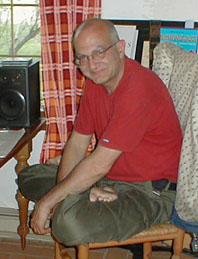©
Nanabozho (the Great
Hare)
This page updated July 14, 2003
 What's the Use?
What's the Use?
Someone wrote to me the other day, asking, "How can you train without respite until success, since training is succcess! Why sit day after day, without caring for apparent (and sometimes daily) failure since sitting day after day is by itself sufficient!" this referring to the last paragraph of my last paper (may 2003).
I admit having remained slightly flabbergasted. Just as if I had allowed myself to say something really stupid, big as a Zen temple in the Loire country, at unawares. In a first moment, my inborn insincerity led me to credit my correspondent with evil intentions. But his following answering mail to mine could not leave any doubt subsiding. I had therefore to look up the problme, despite my natural stiffness. And what a backache!
Actually, all along my purpose in that paper was to attract attention on the need for an ethical behaviour, which is unfortunately too often absent with too many self-styled "buddhist" teachers (and not only within the so-called "Zen" sects. It is rather obvious that this intervention did sidetrack our topic.
Some time ago, in one of his papers, a correspondent in Japan recorded Kodo Sawaki's words, "You don't eat in order to shit." Sorry, I know there are sensible souls on the Net who are disturbed by such a smelly down to earth style.But I'm afraid that this is the way things really are. Fact is that, eating implies that, at the end, we'll have to defecate. And it's rather obvious that if we eat in order to feed ourselves, we can't avoid that disgusting aspect; which is however quite inherent to our nature. Just the same, event though training ourselves be in itself actually the success, we nevertheless need to train. Whoever has fasted (be it voluntarily or not) long enough, knows that to feed oneself after fasting demands efforts, demands that we be careful, that we train into masticating, to ingest anew. Some ten years ago, after a car crash, I was left with both jaws sown together with stainless steel wire, which they'd tighten every week, and this for a month. When they freed me, I was sooo glad that I'd be able again to open my big loud mouth, but nothing of the sort happened. My maxillary muscles had altogether forgotten how to do it. I had to retrain them. I couldn't even get a tablespoon through what teeth I had left.
Just the same, a few years ago, frightened by the number of broken knees encountered across the meditation meetings and various forums, I decided to start practicing some yoga exercises, in order to soften my hips, and to ease the pressure on my knees during the practice periods of Zazen. And indeed, just as explained a yoga teacher in a paper which I have posted and illustrated, it is not the knees that bend, but the articulation of the hips and the thighs. I was, ever since my teens, rather stiff, and the lack of exercise didn't help in any way. I therefore started to train, and this precisely without "any preocupation about the apparent failure -- some daily, at times," and this has allowed me to improve considerably my posture and the ease in holding on to it.
Thus have we here some kind of a paradox. I have to agree with my correspondent, but still must I consider that I'm not wrong. To train is success, indeed, but in order to get there, you have to dot it without caring for the apparent failure.
Mxl